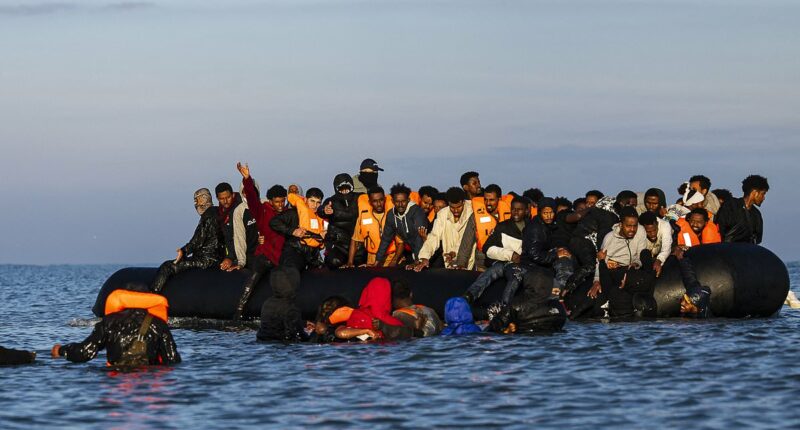Share this @internewscast.com
This week, 16 more migrants who had crossed into the United Kingdom unlawfully were sent back to France as part of Labour’s ‘one in, one out’ arrangement. Meanwhile, numerous other migrants have continued to make the perilous journey across the Channel in small vessels.
The Home Office has reported that these recent deportations bring the total number of individuals returned under this agreement to 42.
Instituted on August 6, the contentious agreement was crafted by Labour with the intention of discouraging migrants from attempting the risky crossing.
Despite these efforts, 401 more migrants have managed to reach British shores via small boats in just the past week.
In addition, since the agreement’s inception, the UK has accepted 23 migrants from France.
This exchange is part of the ‘inward’ route established in coordination with French President Emmanuel Macron during the summer months.
Home Office statistics show that between Tuesday and Friday there were no small boat crossings recorded.
However, a quiet week was followed by a busy Saturday which saw 369 make the crossing on seven small boats.
More flights are expected to take place in the coming days.

Hundreds more migrants have made the crossing while Labour has managed to return just 16 in the past week
Home Secretary Shabana Mahmood said: ‘For many years, illegal migrants entered our country with no consequence.
‘This is the largest return flight under our historic deal with the French. And it sends a warning to those considering entering this country illegally: if you come here by small boat, you can be sent back.
‘This is just the beginning – I will scale up these removals to France. And I will do whatever it takes to secure our borders.’
Sir Keir Starmer scrapped the Conservatives’ Rwanda asylum deal – which was designed to deter crossings and save lives – as one of his first acts in office.
However Shadow Home Secretary Chris Philp previously called the treaty a ‘massive con’.
He said: ‘Labour is swindling the British public.
‘Since the deal became operational over 10,000 illegal immigrants have crossed the Channel and Labour have removed a mere 26.
‘This will obviously not deter anyone.

A large number of small boats used by people thought to be migrants, pictured at a warehouse facility in Dover, Kent
‘We need to leave the European Convention on Human Rights which will enable us to deport people in days – this would be a real deterrent.’
Labour’s deal has been slow to take off after being mired in legal difficulties and even when fully up and running is expected to remove only around 50 migrants a week.
It was also revealed this week that the Home Office has only 12 staff working on the returns deal.
Martin Hewitt admitted to the Commons home affairs select committee the small size of the team dedicated to working on the deal, The Times reports.
He emphasised to MPs ‘a whole host of other people’ are involved in the process too.
The official pointed to staff who process migrants selected for removal at the Manston centre in Kent.
He also noted those at the immigration detention centre at Heathrow, where migrants are held before deportation to France.
And overall, more than 5,000 civil servants in the Home Office and National Crime Agency (NCA) are working on the small boats crisis.

For each one it takes, Britain grants asylum to another who has arrived from France, according to the scheme agreed by Prime Minister Sir Keir Starmer and French President Emmanuel Macron (pictured at the summit in July)
Border Security Command, the immigration enforcement agency Hewitt heads up after his appointment a year ago, funds around 1,000 of them.
To date this year, 36,365 migrants have crossed the Channel, which is a third more than by this time last year.
The record was set in 2022, when 37,099 migrants had arrived by this time of the year.
Mr Hewitt said: ‘I, more than anybody, find the numbers frustrating and really challenging, and this issue could not be more high-profile.
‘But I am convinced that the plan, the sort of cross-spectrum plan that we have in place, is a plan that will deliver, but we need to keep pushing and delivering that plan.’
He also told the committee of his frustration that the scheme has been beset by other difficulties too.
The official said bureaucratic and legal difficulties have prevented French police officers starting to intercept small boats up to 300m from the coast.
He explained the force is still being given specialist training to make sure they are not liable for any deaths which happen in the process.
It also comes amid instability in the French government, which collapsed earlier this month, for the third time in a year.
Though prime minister Sebastien Lecornu was reappointed after his resignation, surviving two confidence votes, interior minister Bruno Retailleau who pushed through the changes at the border has been replaced.
The French government had promised officers would be out intercepting dinghies by the end of the summer.
But currently, they cannot legally step in once the boats are on the water unless passengers ask to be rescued.
Delays to implementation have also come from the French police union, which has requested better equipment and protection.
Mr Hewitt said the prevention of crossings will be made easier once officers are able to intervene.
But when asked about it by the Commons committee, he said ‘we await that being deployed’.
The commander continued: ‘This was referred to by President Macron at the summit in July when he spoke with the prime minister, so it is frustrating that it’s taken the time that it has… the political instability, clearly that has been a backdrop.’

Britain’s border security commander Martin Hewitt admitted to the Commons home affairs select committee the small size of the team dedicated to working on the deal. Pictured: French police officers take photos of migrants boarding a small boat to Britain from France on September 19, 2025
He explained the rise in violence and deaths on Channel crossings on poor migrants from the Horn of Africa storming small boats without paying for their passage.
Eritrea was the most common nationality of migrants crossing the Channel in the first half of this year, with 3,543 from the country making the journey.
Ethiopia, Sudan and Somalia, meanwhile, were all in the top eight.
NCA director-general of operations, Rob Jones, explained to the Commons committee: ‘What has happened this year is the Horn of Africa cohort, through their violent behaviour and then through an accommodation with the smugglers, have driven those numbers up, and that’s what we’re talking about in terms of injuries and fatalities.’

















